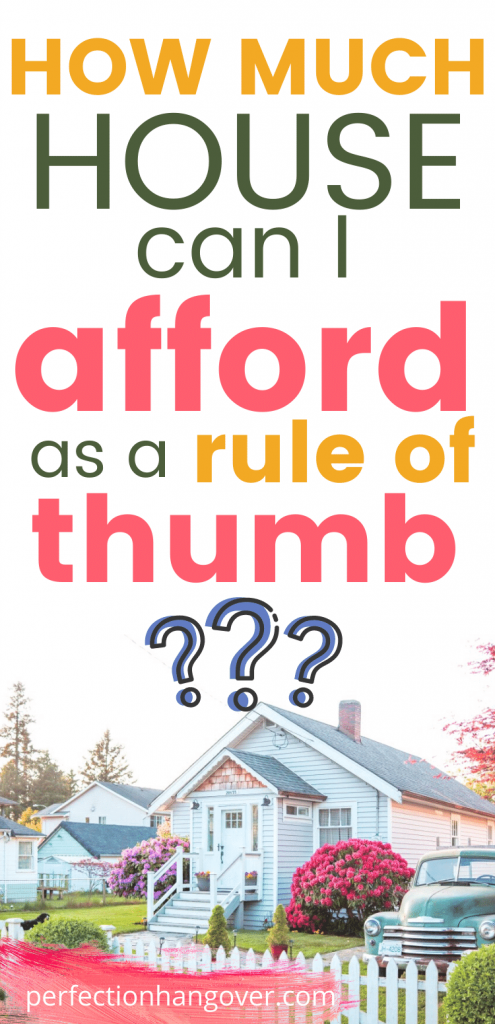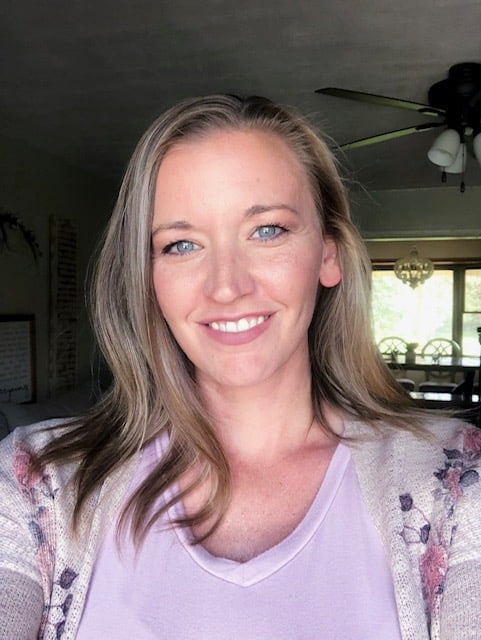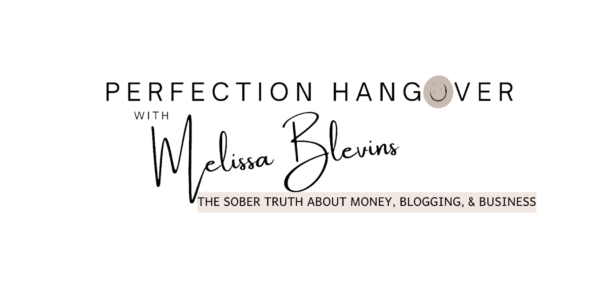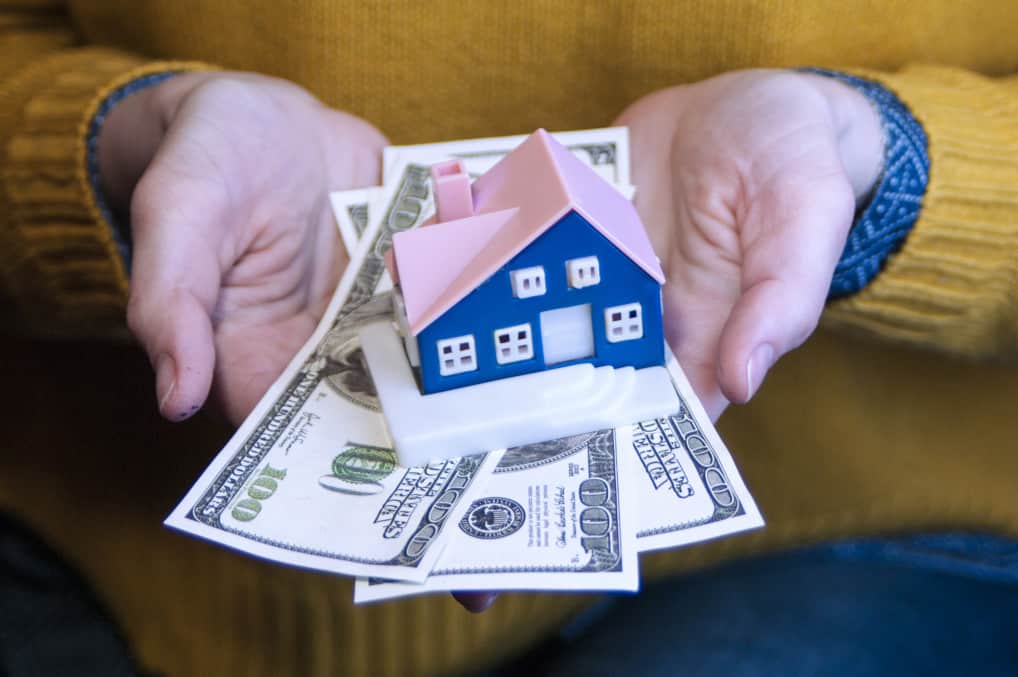This post may contain affiliate links. Click here to read my full disclosure.
You may have seen a house that you absolutely love, but you’re wondering “How much house can I afford as a rule of thumb?”
The answer is quite simple, but you need to know this before you even continue looking into this home (or any other homes).
What’s the harm in looking, you ask? Realtors are paid to show homes. It’s true, but they don’t earn anything for simply showing homes.
You don’t want to waste anyone’s time, including your own, the homeowner, and the Realtor by looking at homes you may not even be able to afford.

Before we get started, if your credit score is below 600, you are probably not ready or able to buy, and you should be asking the following question:
How Much Rent Can I Afford?
The answer to this question is simple. Keep rent as low as possible, while living in an area where you and. your family feel safe.
If possible, keep rent below 20%, but definitely below 25% of your monthly income. You can calculate based on gross income or net (take-home), but remember:
The reason you are wanting to keep this number low is so that you can save enough money and/or pay off debts and take care of collections that may be hindering you from buying a house right now.
The lower the rent payment, the more you can save and/or pay off debt and achieve your goal of owning a home one day.
How Much House Can I Afford According to Dave Ramsey?
Dave Ramsey is a financial radio talk show host and author. He wrote the popular book The Total Money Makeover, and his advice is very to-the-point and doesn’t usually waiver.
Dave’s advice is simple.
Your house payment should be no more than 25% of your take-home pay, including principal, interest, taxes, and insurance.
He recommends a conventional, 15-year, fixed-rate mortgage with at least 10% down.
You’re probably wondering if you should take advantage of your benefits as a veteran by applying for a VA home loan at 0% down. The answer is probably not. I’ll explain more on that later.
You can grab a free copy of Dave Ramsey’s audiobook here by signing up for a trial of Audible.
How Much Money Do I Need to Buy a House?
There are a lot of costs associated with buying a home, and it can be more costly to own a home vs rent from a maintenance standpoint. Let me explain.
Cost of Buying a House
Down Payment
The down payment can be as little as 0% or as high as you’re able to pay. It is always best to pay 20% down minimum to avoid PMI, or private mortgage insurance.
PMI protects the lender in case the buyer defaults on the loan. This does not go towards the principal or interest and could be considered throwing money away.
Home Inspections
The whole home inspection might cost approximately $350-450. Radon and Lead-Based Paint Inspections are optional and can add another few hundred dollars. Septic inspections are often required by the lender if the home indeed has a septic system, and they cost around $200. All homes should have a termite inspection to ensure that no wood-destroying insects are present. This usually costs $100 or less.
Closing Costs
Closing costs average 2-5% of the cost of the home amount, so if you’re buying a $200,000 home, your closing costs, on average, would be around $6,000.
- Application Fee: Most lenders charge an application fee to process the initial application. This fee is often negotiable.
- Appraisal: The appraisal fee is usually around $400-500 and is paid to a third-party appraiser to confirm market value of the property.
- Attorney Fee: Often a flat fee, this adds another few hundred to closing costs. This fee is paid to the title company or attorney for servicing the closing. Some states require a real estate attorney to be present at every closing.
- Courier/Mail Fees: This covers the cost of transporting documents to complete the loan transaction as quickly as possible.
- Credit Report: A tri-merge credit report is pulled to get your credit score and payment history. Your credit score plays a major part in determining creditworthiness, interest rate, and other terms.
- Escrow Deposit for Property Taxes & Mortgage Insurance: Most buyers are required to pay two months of property tax and mortgage insurance payments at closing.
- FHA Up-Front Mortgage Insurance Premium: If you have an FHA loan, you’ll be required to pay the UPMIP of 1.75% of the base loan amount. You can choose to roll this into the cost of the loan if you prefer. Side note: The FHA loan is one of the worst mortgage programs available. Find out why.
- Flood Determination or Life of Loan Coverage: This is paid to a company which determines if the property is located in a flood zone. If the property is found to be located within a flood zone, you will need to buy flood insurance. The insurance is a whole separate expense.
- Home Inspection: As mentioned above, home inspections are always recommended. Have your Realtor negotiate a due diligence period in the contract, allowing you to determine that the home is in satisfactory condition before you close on the home. This is so important!
- Home Owners Association Transfer Fees: The Seller will pay for this transfer which will show that the dues are current, how much annual dues cost, etc. Learn and understand your HOA restrictive covenants for your new home.
- Homeowners’ Insurance: This covers wind, hail, fire, lightning, and other damage to your home. You’ll have to pay an annual premium at closing, and your lender will likely keep an escrow account with a portion of your monthly mortgage payment for insurance costs.
- Lender’s Policy Title Insurance: This is insurance to assure the lender that you own the home and the lender’s mortgage is a valid lien, and it protects the lender if there is a problem with the title.
- Loan Discount Points: “Points” are prepaid interest. One point equals 1% of your loan amount. This is a lump-sum payment that lowers your monthly payment for the life of the loan. It may also be tax-deductible but check with a tax professional.
- Owner’s Policy Title Insurance: This is an insurance policy that protects you in the event someone challenges your ownership of the home. It is usually optional.
- Origination Fee: This covers the lender’s administrative costs. It’s usually about 1 percent of the total loan but you can sometimes find mortgages with no origination fee.
- Prepaid Interest: Most lenders will ask you to prepay any interest that will accrue between closing and the date of your first mortgage payment.
- Private Mortgage Insurance (PMI): As mentioned earlier, PMI is extra insurance you have to pay in the event that you don’t put down at least 20%. If required, you may need to pay the first month’s PMI payment at closing.
- Property Taxes: Typically, lenders will want any taxes due within 60 days of purchase by the loan servicer to be paid at closing.
- Recording Fees: A fee charged by your local city or county, for the recording of public land records.
- Survey Fee: This fee goes to a survey company to verify all property lines and things like shared fences on the property. Not required in all states.
- Title Company Title Search or Exam Fee: This fee is paid to the title company for doing a thorough search of the property’s records. The title company researches the deed to your new home, ensuring that no one else has a legal claim of owning the property.
- Transfer Taxes: This is the tax paid when the title transfers from seller to buyer.
- Underwriting Fee: This is a lender cost for the work and research completed to determine your approval and/or creditworthiness for the loan.
- VA Funding Fee: If you have a VA loan, you may be required to pay a VA funding fee at closing (or you can roll this fee into the cost of the loan if you prefer). Similar to the FHA mortgage insurance premium, the VA charges a percentage of the loan. This is really disguised PMI, y’all. This is why the VA loan is no better than an FHA loan or USDA/Rural Loan.
Why Is Renting Sometimes Considered Throwing Money Away?
Often renters are rushed into buying a home because they are told they are “throwing money away”. The trouble with this scenario is that they aren’t quite ready for the financial responsibility of owning a home.
People say that renting costs more than buying, and if you’re comparing monthly payments, I can see how it would be perceived that way. But consider this.
Let’s say you’re looking at $150,000 homes in your area, and you just don’t have the funds to put 20% down (or even 5% on a conventional loan).
The mortgage payment on the $150,000 home, according to your lender, would be approximately $1,000 per month, with 5% down at a rate of 4.5% APR, with $2400 in taxes and $1000 in homeowners’ insurance. (30-year fixed rate)
But you also have to pay PMI, remember? So let’s assume that adds another $120 per month to the payment, totaling $1120 until you can get down to 80% loan to value.
So you start comparing rentals, and they cost $1300/month rent, and you’re thinking that $1300 is obviously higher than $1120, so why not go ahead and buy?
Here’s the thing. When you sign a lease, and it adds the total of all monthly rent payments into a total sum, for the house above, it would cost $15,600. So it’s completely natural to think you’re throwing $15,600 away at renting.
But when you multiply $1120 *12 months of mortgage payments, the total of $13,440 did not reduce your total balance owed by $13,440. Let that sink in for a minute.
In fact, in the first year of owning a home, you would have only reduced your principal balance by $2,298 (assuming you paid only the minimum house payment).
The rest of the mortgage payment was applied to interest, taxes, insurance, and PMI. So renting is not throwing away money as long as you’re renting with the goal of getting your financial house in order.
Once your unsecured debts are paid off and your finances are in better shape, you can buy the home of your dreams. Your income is your greatest wealth-building tool. And when you tie up your money in large assets you can’t afford, you often end up house poor with no money to furnish it.
Understanding how much house you can afford is important for your overall financial well being. Hopefully, this information will serve as a home affordability guide for your future real estate investments.

Life is a collection of memories and experiences. There are ups and downs. I am so grateful for God’s grace and am on the journey to a renewed spirit, free of perfectionism. Perfection Hangover offers the sober truth – no filter.



There is so much that goes into buying a home. Thank you for sharing! I think people also underestimate how much you potentially need to spend on repairs and maintenance in the future so it’s ideal to have savings to cover unexpected surprises as well.
Thank you Melissa.
Well, my rent payment is about 50% of my wages right now. It is a situation I can do nothing about right now.
As entreprenuers we are taught to not invest in a private residence using earnings like a salary.
So, the types of property I would look at (when the time comes) are commercial. What ratios would you suggest for one looking to invest in commercial property?
Honestly, I wouldn’t feel qualified to answer that question as I’ve never done commercial real estate investing personally.
I think the right question is what is the least house I can enjoy living in? My spouse and I are still in the first and only house we bought 41 years ago. It cost $32,500. We have added on and modernized it a few times, with cash. But it still represents only a single digit percentage of our net worth. I would hate being in a position where my house represented 10 or 20 or 50% of my net worth. Because our paid for house’s value is basically pocket change to us, we could just walk away and it wouldn’t impact our retirement lifestyle, its just not worth that much money. So we don’t worry about the neighborhood going down in value or if our small city loses a few major employers and there is a housing glut. Those are real worries for a lot of retired people, especially if they have lived in the same house for a long time. You never know if what used to be a great location with great schools will fall out of favor with younger house buyers. Great advice in your post!
All great factors to consider, Steve! And that investment is amazing! We just moved to Gulf Breeze, Florida, and our next door neighbors bought their house 6 years ago for $150,000, and today it is worth $250,000 (and would sell in a day on the market probably). Some incredible deals to be had if you know where to look and how much house is too much (as you stated).